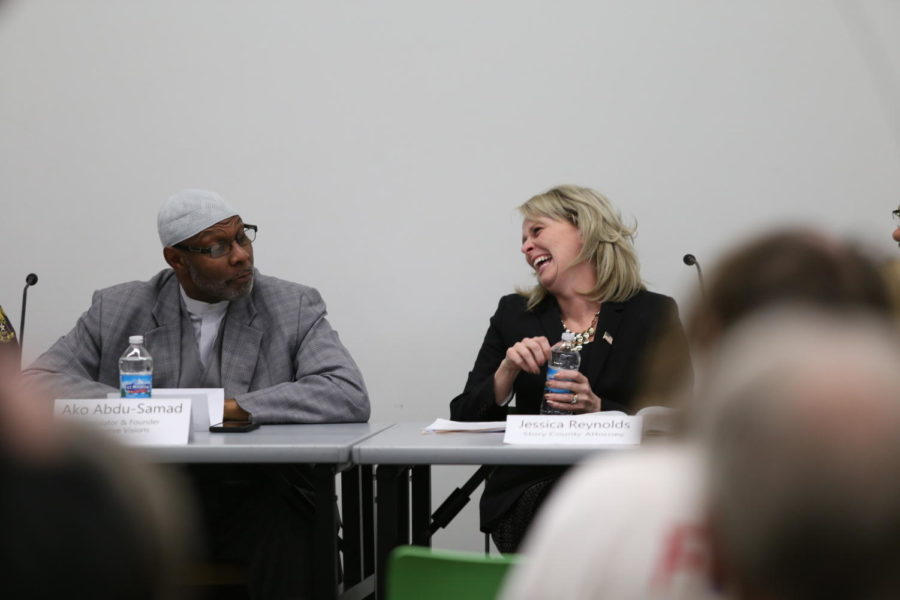Local leaders discuss ‘Stand Your Ground’ law
Danielle Peterson/Iowa State Daily
Jessica Reynolds, Story County Attorney, and Ako Abdul-Samad, legislator and founder of Creative Visions, share a moment on the Iowa’s Stand your Ground Law Panel. The panel was held Thursday at the Ames Public Library.
February 7, 2019
The Ames Public Library welcomed five government officials to talk about Iowa’s controversial, “stand your ground” law Thursday night.
The panel included Commander Geoff Huff of the Ames Police Department, State Rep. Ako Abdul-Samad and Story County Attorney Jessica Reynolds. Together, the group discussed different aspects of the law including its subjective nature and the groups of people it affects most.
The law, which was adopted in 2017, is commonly known as the “stand your ground” law. Chapter 704 of the Iowa Code says an individual who believes there is reasonable risk to themselves may use reasonable force to prevent personal harm. This includes deadly force, as the law mentions firearms.
Abdul-Samad argued in opposition to the law because of its disproportionate effect on minorities.
“We don’t live in a country that has a level playing field,” Abdul-Samad said.
Abdul-Samad cited the case of Trayvon Martin as an example of a black man being shot for appearing threatening, saying he believes the law is a tool that allows people to act on fear and a line should be drawn between self-defense and fear.
Abdul-Samad considers the law illegitimate and said Iowa should go back to the old self-defense laws that allowed a person to use reasonable force to defend themselves and their properties.
Reynolds also expressed her discontent with the law, saying it is based on subjectivity.
If a person feels threatened, they can use deadly force. The law also allows for mistakes, meaning if a person were to shoot someone they mistakenly took as a threat, they would not be held legally accountable. According to her, the perceived threat an individual feels is not a good basis for law.
“As a county attorney and someone who enforces laws, I like objectivity,” Reynolds said.
She told the audience that because the law is based on a subjective principle, different parts of the state are dealing with the law’s procedure in separate ways. Reynolds said she believes this is unfair to her, and she sees the potential for misuse or misapplication, which could muddy the waters in a lot of legal situations.
“It changes the potential self-defense claim in any case,” Reynolds said.
Huff spoke about the role of police in the sometimes complicated situations of a “stand your ground” law. Their job is not to determine guilt but to act as fact finders and gather information in order to discover the truth.
He said that citizens can help the police out in these situations by providing any evidence, especially videos.
Huff also discussed the idea behind the law in accordance with what is called “the castle doctrine.” The concept of the doctrine is that someone has the right to defend their lives, relatives and property if they are threatened. This is especially applicable to instances of home invasions.
Regarding the provision of the law that protects the individual who used deadly force, he said that the intention behind the law was to allow for innocent mistakes.
The law becomes particularly complicated when a person dies in the case. Without other evidence, the authorities have to rely on the word of the individual claiming self-defense.
“There’s always more to it than just the testimony of one person,” Huff said.
All five members of the panel were opposed to the stand your ground law, and Abdul-Samad encouraged the audience members to initiate a change.
“Iowa has a history of doing the right thing and we’re losing that,” Abdul-Samad said.







